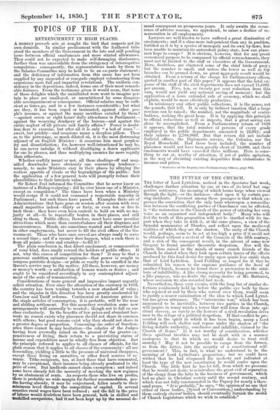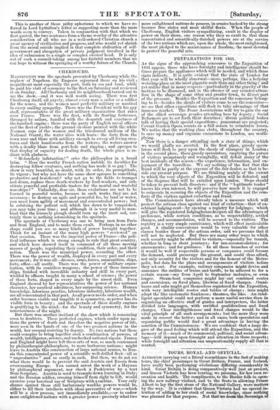'11LE FUTURE OF THE CHURCH.
THE letter of Lord Lyttelton, noticed in the Spectator last week,, challenges further attention by one or two of its brief but sug- gestive sentences, the meaning of which looms large when viewed through the light—or the darkness—shed upon it by certain pas- sing incidents. Foremost among these passages is that which ex- presses the conviction that the only basis whereupon a reconcilia- tion between the conflicting parties of Churchmen can be effected, is "the restoration to the Church of the power of uttering her own. voice as an organized and independent body." Many who will feel the truth of this proposition will yet be startled with its im- port when they take in with it, at the same glance, a view of the Synodal mummeries of Thurles and reflect upon the medimval realities of which they are the shadow. The unity of the Church would, perhaps, seem to be set at too high a price if it could not be obtained. without a revival of the Councils of the fifth century,. and a risk of the consequent result, in the advent of some new Gregory to found another theocratic despotism. Nor will the alarm thus raised in the minds of many stanch friends of the Church be abated when they look upon certain traces of the effects produced by this fond desire for unity upon minds less stable than that of Lord Lyttelton. Lord Feilding so longed for it that he submitted his reason to the supreme guidance of the head of another Church, because he found there a pretension to the attri- bute of infallibility. A like strong necessity for being governed, to a like purpose, was no doubt the ruling motive of Mr. Bathurst, whose secession we also recorded last week.
Nevertheless, those very events, with the long list of similar de- feetions assiduously held up before the public eye both by those who rejoiced at and by those who sorrow over them, would seem to justify a nearer examination of the idea to which Lord Lyttel- ton has given utterance. The "internecine war," which has been announced to be inevitable, between two parties in the Church, will inspire in many minds a terror that will force them into spi- ritual slavery, as surely as the horrors of a civil revolution drive. men to the refuge of a political despotism. If that conflict be
pro- secuted in the spirit in which it has been begun many a rd Feilding will seek shelter and repose under the shadow of "the living definite authority, conclusive and infallible, claimed by the Church of ltome." Is it not worthy of consideration, whether these spiritual troubles may not be dealt with in a manner, analogous to that in which we would desire to treat civil anarchy ? May it not be possible to escape from the former, as from the latter, into the security of a constitutional self- government ? This, in fact, is what we understand to be the meaning of Lord Lyttelton's proposition; but we could have wished that he had o'erpassed his modesty and indicated at. least the type of the new constitution he would confer upon the Church. One little hint he has let fall, from which we presume that he would not desire to reintroduce the great evil of separation of the clergy from the laity in the business of government, which had no place in Christian society until the second century, and which was not fully consummated in the Papacy for nearly a thou- sand years. "It is ,probably," he says, "the opinion of no one that either of these bodies, [Synod or Convocation,] understanding by them entirely clerical bodies, should eventually furnish the model of Church Legislature which we wish to establish."
This is another of those pithy aphorisms to which we have re- ferred in Lord Lyttelton's letter as suggesting more than the mere words seem to convey. Taken in conjunction with that which we first quoted, the two sentences form a theme worthy of the attentive consideration of all who see in a well-ordered Christian church a great agency of civilization and progress, and who would yet shrink from the moral suicide implied in that corn alete abdication of self-
government and abrogation of private ju 'eat involved in the idea of submission to a single or complex clerical head. It is only out of such a council-taking among her faithful members that we can hope to witnesi the springing of a worthy future of the Church.



























 Previous page
Previous page